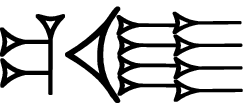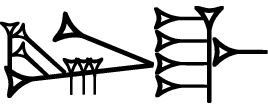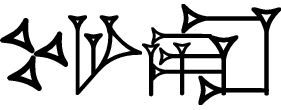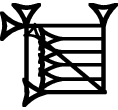So yesterday I had a bit of the Blessed Madness come upon me, and when that happens I must drop everything and chase it because it happens so rarely, and when it does it always gives me really good material.
So in the lore of Vampire: the Masquerade, the first vampire was Caine, the son of Adam and Eve, and vampirism was his curse for murdering his brother Abel. There's no date on when the first clans emerged, but they are mentioned as developing in the "First City", as in "the first city to ever exist".
One of the things which has bothered me about V:tM is that even though the vampire clans date back to the dawn of civilization, the names for those clans are very modern in comparison. Toreador, Brujah, and Lasombra are Spanish; Gangrel is Middle English; Ventrue is French. The Latin Salubri is respectably old, and even though Egyptian mythology is older than Roman, the -ite suffix in Setite is Greek.
In other words, in my extreme nerdery I wanted vampire clans to have names which were as old as they were, even if those original names weren't used any more due to linguistic drift (and the fact that players probably couldn't, and definitely wouldn't, like to use them). So I looked up which language was the oldest, and as it turns out the oldest known written language is Sumerian. This was ideal for my purposes because Sumeria was in the Fertile Crescent of the Middle East and therefore meshed perfectly with the Abrahamic origins of V:tM.
Did you know that there's an online Sumerian dictionary where you can search for words in English? You do now. What's more, most of the words there have pictures of them written in Cuneiform (the written script of the Sumerians, among others -- sort of like how most of the Western world uses the Roman alphabet) and they are delightfully archaic and creepy. You know how in the Blade movies the various vampire houses had cryptic sigils? Well, Cuneiform looks older and creepier, and because it's an actual language it looks more legitimate as well.
So here are the clans of Vampire: the Masquerade as I think they would have been named during the time of the First City. Because I am a hobbyist scratching at something deeper than I can imagine, I have probably gotten some things wrong. But that's okay, because we aren't looking for accuracy (because vampires don't exist), we're looking for things which are fun and flavorful.
Canonical Clans
Banu Haqim: Sagaz
Sa-gaz (“Robber; murderer”)
The Banu Haqim (formerly known in previous editions as Assamites) are a clan of vampires who lust after the blood of other vampires and, in previous editions at least, hired themselves out as assassins who would take as part of their payment the blood of their victim. Therefore, someone who robs and kills seems an excellent fit here.
Brujah: Ursag
Troile, the founder of the Brujah line, had a mighty temper and a preference for physical altercation. Modern Brujah see themselves as righteous rebels fighting against The Man, they clearly see themselves as heroes. Given all that, I couldn't have picked anything else.
The Cappadocians have always been known as the Clan of Death.
A clan of shape-shifters who take on bestial features as their humanity slips.
Lasombra: Gissu
Gissu ("shade, shadow; protection, aegis")
Yay, the clan whose name means "The Shadow" and which has shadow powers has another name which means shadow. Yawn.
See below for what I picked for my highly non-canonical Lasombra.
I'm very proud of this one, as I couldn't find a translation for "madman" or "seer" or things like this. However, "insight" is a nicely vague word which both compliments their abilities and touches upon their madness (as in "seeing what others do not").
Nosferatu: Ludubgara
Lu-dub-gar-ra (“Hunter”)
Abisimilard, the founder of the clan, was known as a mighty and stealthy hunter.
Ravnos: Dabariri
Da-ba-ri-ri (“Liar, Trickster, Con Artist”)
Regardless of whether you go by the official version of this clan or my own, the fact remains that the Ravnos are distrusted by the rest of kindred society, and so this fits. It's doubtful that the Ravnos themselves would call themselves this, but unlife isn't fair and so if everyone else calls you this, this is what you're called.
The easy solution would have been to go with "doctor" or "healer" but I felt that pigeonholed this clan too much. Abgal gives them flavors of wisdom and holiness which were lacking from other names.
Setites: Musgal
No, I refuse to call them "The Ministry". Go away.
Mus-gal ("Great serpent")
Y'know, it's funny: the Setites have this whole snake motif going on, yet Set himself has the head of a jackal, not a snake. But then, I think this entire clan is stupid and I'm not going to waste any more time on them.
This was another difficult one. I couldn't find a Sumerian word for "artist" or "artisan", or even "beautiful". I found this, though, and I feel that it fits well, for no other clan are experts on art and beauty.
Tremere
They don't have a Sumerian name because they didn't exist until 1022 AD.
Tzimisce: Uzu
Uzu (“Flesh, body, entrails, omen”)
The Tzimisce are a clan of flesh-shapers, but if I'm being honest the real reason I picked this name is because the word looks like a body.
Also, and I am not joking, there is an actual Sumerian phrase uzu zu kešda gu-mur which means "flesh tooth bind spine" and I can't think of a better way to describe Vicissitude than that.
The Ventrue are the Clan of Kings. Self-explanatory.
Non-Canon Clans
Ba'ali: Kurgara
Kur-gar-ra (“Cultic performer”)
As I've mentioned elsewhere, I hate the Followers of Set and so the demon-worshipping Ba'ali are the super-evil baddies in my V:tM world. "Cultic performer" is close enough to "cultist" for my taste, and I am tickled that the first character resembles Damien's triple-6 birthmark from The Omen.
Dar (“To break up, crush, grind; to split, split up; to cut open”)
This is for my non-canonical, not-having-shadow-powers version of the clan which are cancerous corruptors who blackmail people and hollow out organizations in order to control them. I feel that the meaning of this word perfectly encapsulates how I see the Lasombra operating.
Nagaraja: Sugzag Gu
Sug-zag gu (“To destroy completely” with “gu” meaning “to eat, consume”)
This is for my version of the Nagaraja. The word is interesting because "sugzag gu" as a whole means "to destroy", but the component "sugzag" means "marsh edge" and "gu" means "to eat". This makes me think of a crocodile dragging its prey underwater, never to be seen again and to be devoured at its leisure. This really fits with how I envision the Nagaraja.



















No comments:
Post a Comment